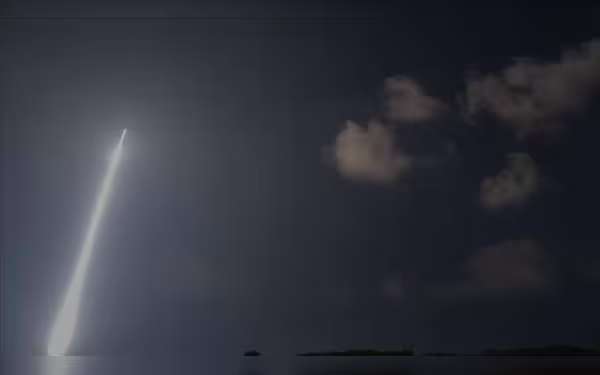Saturday, November 16, 2024 05:54 PM
Israel Prepares Military Action Against Iran with US Support
- Israel deploys THAAD missile defense system amid rising tensions.
- Iran's missile attack on Israel escalates conflict dynamics.
- US and Israel coordinate closely for potential military response.
 Image Credits: nation_pk
Image Credits: nation_pkIsrael prepares for military action against Iran, deploying THAAD missile defense with US support amid escalating tensions.
The ongoing tensions between Israel and Iran have escalated significantly in recent weeks, particularly following a missile attack by Iran on Israel earlier this month. This situation has prompted Israel to prepare for potential military action against Iran, with the backing of the United States. The Israeli media reported on Sunday that the Israeli army has already made decisions regarding its response to Iran, although the specific timing of any action remains uncertain.
In a significant move, the Israeli army announced the deployment of the US-made THAAD missile defense system within its borders. This system is designed to counter long-range ballistic missile threats, particularly those that may come from Iran. The deployment of THAAD is seen as a crucial step in Israel's preparations for what is being described as a "major" strike against Iran. The Israeli military is coordinating closely with the US, ensuring that American officials are informed prior to any military action against Iran.
The THAAD system, which stands for Terminal High Altitude Area Defense, is operated by American personnel stationed in Israel. It is specifically designed to intercept ballistic missiles at high altitudes, thereby significantly enhancing Israel's air defense capabilities. Manufactured by the US defense company Lockheed Martin, the THAAD system is capable of intercepting both short- and medium-range ballistic missiles, making it a vital asset in Israel's defense strategy.
The backdrop to these developments includes a missile attack launched by Iran on October 1, which involved approximately 180 missiles. This attack was reportedly in retaliation for the assassination of key figures, including Ismail Haniyeh, the former chief of Hamas’ political bureau, and Hezbollah leader Hassan Nasrallah. The Israeli military confirmed that this missile barrage caused damage to some of its air bases, indicating that preparations for a retaliatory response against Tehran were already in motion.
Iran has defended its missile strike by citing Article 51 of the UN Charter, which allows member states to use force in self-defense following an armed attack. This legal justification adds another layer of complexity to the already tense situation, as both nations navigate the delicate balance of military action and international law.
As the situation continues to unfold, it is essential for observers to consider the broader implications of these military preparations. The potential for conflict between Israel and Iran not only affects the two nations involved but also has significant ramifications for regional stability and international relations. The world watches closely as both sides prepare for what could be a pivotal moment in Middle Eastern geopolitics. Understanding these dynamics is crucial for anyone interested in global affairs, as the outcomes of such conflicts can shape the future of international diplomacy and security.













